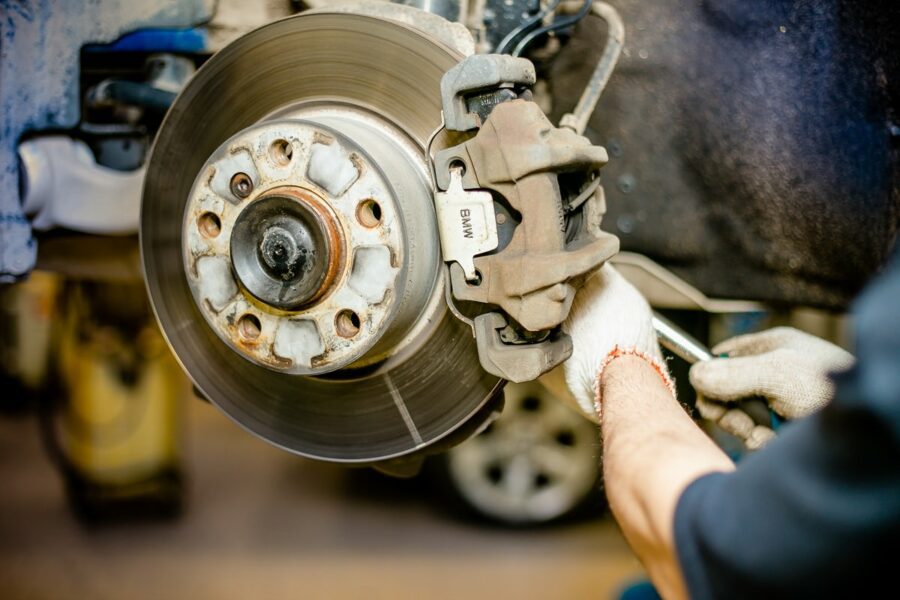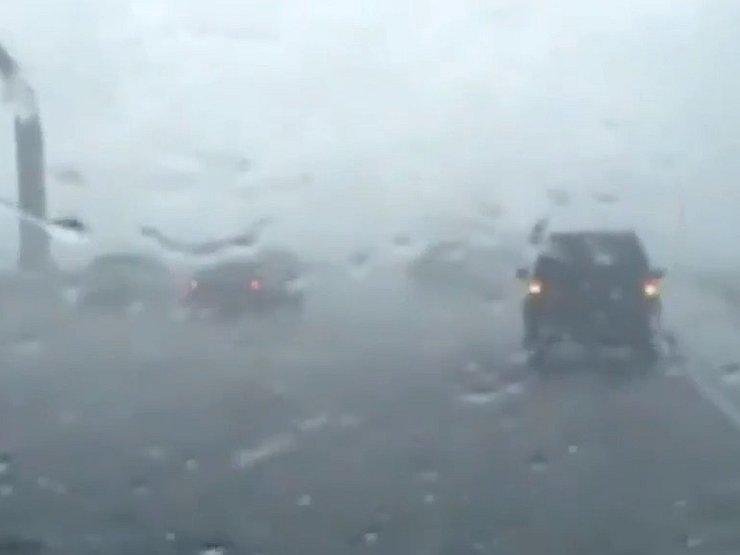
Why do brakes squeak and whistle
From time to time, every motorist hears the whistle and grinding of the brakes of his car. In some situations, the sound disappears after a few short presses on the pedal. In others, the problem persists. The extraneous noise of the brakes cannot be ignored, since safety on the road depends on it.
Consider the reasons for the creak of the brakes, as well as what can be done in each individual situation.
Brakes squeak: the main reasons
Before diving into the main reasons why pressing the brake pedal causes additional noise, let's briefly recall the brakes. On each wheel, the system has a drive mechanism called a caliper. It grips a metal disc attached to the wheel hub. This is a disk modification. In a drum analog, the brake cylinder opens the pads, and they abut against the walls of the drum.
Most modern mid and premium cars are equipped with disc brakes in a circle, so we will focus on this type of actuators. The brake caliper design is described in detail in separate review... But in short, during braking, the caliper pads clamp the rotating disc, which slows the wheel down.

Since the material used to make the friction lining wears out due to friction, the first thing you should pay attention to is what condition the pads are in, as well as the disc itself (how big is the production on it). The pad should be thick and tight against the disc, the surface of which should not have deep scratches and high wear rims.
As soon as the driver starts to hear constant or short-term noise coming from the brakes, he needs to visit a service center. There the wizards will carry out diagnostics, and tell you what the problem is, and also help to solve it.
A similar malfunction can be observed even in relatively new machines. In some cases, unpleasant noise is not accompanied by deterioration of the brakes. In others, the opposite is true. If the car has already traveled a couple of tens of thousands of kilometers, and a whistle or rattle began to appear, this may indicate natural wear of the friction material.

However, there is a situation when a part of the mechanism breaks down, due to which non-standard malfunctions may appear. Here is a small list of reasons for squeaking brakes:
- Poor-quality block;
- Dirt in the mechanism;
- Sometimes the brakes begin to creak with the onset of frost (this may depend on the material of the contact surface);
- Many shoe modifications are equipped with a steel plate. When the pad is worn out to a certain level, it begins to touch the disc and emit a characteristic squeak. This is a signal to replace the part. Sometimes this can happen with new consumables that have a wear indicator. The reason is that the plate may not adhere well to the case, which is why it often contacts the surface of the disk. If the defective part is not replaced, it can cause deep wear on the contact surface of the disc.
Natural vibrations
When the brakes are activated, the pads begin to touch the surface of the disc and vibrate. The sound resonates in the wheel arch, causing the driver to fear that there is a breakdown in the mechanism. Depending on the car model, this squeak may not be heard.
Some manufacturers, in the process of manufacturing high-quality brake pads, add special linings to the friction layer that dampen the resulting vibrations. More details about different modifications of the pads are described here.
Sometimes car owners make small brake upgrades. On the block, they make one or two small cuts of the friction layer (width 2-4 mm.). This slightly reduces the contact area with the disc, reducing natural vibration. This situation is not a sign of a breakdown, due to which an appeal to a car service is required.
Another reason for the appearance of such noises is associated with the dishonesty of the workshop workers who recently replaced the pads. To prevent the caliper from creaking due to such vibration during braking, an anti-squeak plate is placed on the contact side of the piston and the pad. Some unscrupulous mechanics deliberately do not install this part, which makes the trip uncomfortable.

Over time, the absence of an anti-squeak part will cause characteristic vibration and squeaking. An uninformed motorist comes to the conclusion that something has happened to the brakes, and repair work needs to be done again.
The same effect appears when this plate rusts or crumbles altogether. When buying a new set of pads, you should make sure that this part is in stock. Some companies sell these parts separately.
New pads
Permanent squeaking may occur after replacing the pads. It is also a natural effect. The reason for this is a special protective layer on the surface of new pads. Noise will be heard until the layer is completely worn out.
For this reason, mechanics recommend, after installing new elements, "burn through" them with a sharp braking load. The procedure should be carried out on a safe stretch of road or even in an enclosed area. In some cases, in order to erase the protective layer, it will be necessary to drive with periodic braking for about 50 kilometers.
Incompatibility of pad and disc materials
When making pads and discs, the manufacturer can use their ratio of the components that make up these parts. For this reason, the element can be incompatible with the part installed on the car, which can cause accelerated wear or constant squeaking of the brakes.

Sometimes such incompatibility of materials seriously affects the braking of the vehicle, which is why the spare part must be replaced with a more suitable analogue.
Another reason the brakes can make a distinctive sound is the deformation of the friction surface. This happens if the block is heated up and then sharply cooled. The temperature of the part can quickly drop when it does not go around the puddle after a long trip with frequent braking.
Also, a similar effect can be caused by a car wash on a hot summer day. Water for these purposes is not heated, therefore, a sharp cooling is formed, due to which the physical properties of the part can change, and it will lose its effectiveness. Only replacing the pads, and in some extremely rare cases, the disc, will help to solve this problem.
Due to deformation, they do not fit snugly against the disc, which will cause their surface to wear out much faster than the manufacturer intended. Of course, a car with such brakes can be operated, just the friction layer on one side will wear out much faster. If the driver has iron nerves, then the creak in such a situation will not bother him, which cannot be said about others.
Overheating disk
A disc brake can suffer not only from overheating of the pads, but also from the disc itself. Sometimes extreme heat and constant mechanical process can change the geometry of this part. As a result, there is frequent contact of the elements of the brake system with each other, because of which, when pressed, the wheels will begin to creak.

Such a problem can be detected by diagnostics at a car service. The repair of the disk cannot be postponed, because the efficient operation of the entire system depends on its geometry.
It's time to lubricate the mechanism
One of the common causes of brake squeaks is a lack of lubricant on the moving parts of the caliper. The lubrication for each part can be different. We recommend that you familiarize yourself with the intricacies of this procedure, which is described in separate review.
Failure to lubricate the mechanism with an appropriate material may not affect the deceleration performance. However, it happens that the mechanical drive can become blocked due to a large amount of rust. A worn-out unit will need to be replaced, and compared to consumables, it costs much more.

It is easier to lubricate a functional unit than to wait for it to break and then allocate additional funds to replace it. For this reason, the motorist should be careful about the condition of his car's calipers.
Grinding brakes: root causes
The main reason for grinding, provided that the brakes are in good working order, is the wear of the lining to the signal layer. The production of such modifications is now popular for budget cars. Manufacturers use a special admixture, which, upon contact with the disc, begins to emit a constant grinding. If this sound is ignored, the pad can wear down to metal, which can quickly damage the cast iron brake disc.
Here's what can create a grinding noise in the brakes:
- It's time to change the disc or consumables;
- Wetting of the contact layer or getting between the elements of foreign objects;
- Wedge of mechanism elements;
- Low quality friction linings;
- The dust shield is deformed.
Each of these factors can drastically reduce the working life of the actuators. Damaged elements will have to be replaced, which is much more expensive than an elementary maintenance procedure that you can carry out yourself.
Pads or discs worn out
So, the most common factor due to which the grinding is formed is abrupt or natural abrasion of the pad surface. A wear indicator is a layer of metal particles in the friction part of a pad. When the surface is worn down to this layer, metal contact results in a characteristic grinding sound.
This sound cannot be ignored, even if the car has not lost its brake grip. With each kilometer traveled, the pad wears out more, which will negatively affect the condition of the discs. Such consumables must be replaced as soon as possible.

The main material from which discs for car brakes are made is cast iron. Although it is much stronger than the contact surface of the pads, this metal does not tolerate high heat. The physical contact of the signal layer with the heated disc accelerates the wear of the second one, and its replacement is a more expensive procedure.
Water, dirt or stone has entered the system
The modern disc brake system has one advantage over drum brakes. The mechanisms in it are better ventilated, which provides more efficient cooling. True, this advantage is also its key disadvantage. Driving in dusty and muddy terrain may result in foreign objects (pebbles or branches), dust or dirt falling into the unprotected parts.
When the driver applies the brakes, the abrasive starts to scratch against the discs, creating a characteristic sound. In this case, you need to check as quickly as possible which wheel has a problem and clean the contact surfaces.

Water trapped in the mechanism has the same effect. Although it has different physical properties and cannot scratch metal, if the brakes are hot and cold water gets on the brakes, the metal surface may deform slightly. Due to this malfunction, grinding grinding may occur even when the vehicle is picking up speed.
If a motorist is fond of off-road driving, then rust can form on metal surfaces (discs or mechanisms), which also creates a similar sound and slowly damages the part. To avoid accelerated wear and damage of parts, the driver must avoid getting the wheels into puddles during long journeys or in the heat. Regular lubrication of mechanisms with appropriate substances will also help.
Caliper or cylinder seized
If the driver ignores the above symptoms and does not take routine maintenance, the caliper actuator may eventually jam. Regardless of the position in which the wedge is observed, it is always fraught.
In the event of a wedge with an inactive system, the car will not be able to stop in time in front of an obstacle. When locking occurs by pressing the pedal, it can provoke emergency braking, which creates an emergency situation.

To avoid such problems, at the slightest sign of a change in the effectiveness of the brakes, the motorist should immediately contact the service station to check the system. For more details on diagnosing and troubleshooting car brakes, read here.
Pads of poor quality
When purchasing cheap consumables, you need to be prepared for the fact that when the base layer is developed, the signal part of the part can severely scratch the discs due to the high content of abrasive impurities.
In addition to the constant annoying grinding noise, this problem reduces the working life of the part. To prevent this, replacement of the pads is required as soon as the characteristic sound appears. Better to buy quality products. Consumables for cars are not so expensive that, due to their poor quality, they throw away a main part that could last much longer.
The geometry of the dust shield is broken
The deformation of this element is also caused by overheating, like a brake disc. Also, a similar problem occurs when the car overcomes an unfamiliar area and a hard object hits the screen.
Sometimes the dust shield changes shape as a result of an illiterate repair. For this reason, if there is no experience in repairing or maintaining the brake system, it is better to take the car to a specialist.

The drum brake modification deserves special attention. Although foreign objects and dirt from the outside cannot a priori get into their design, the pads in them also wear out. Diagnostics of such a system is complicated by the fact that it requires dismantling the wheel, and the drum must be partially disassembled (at least to check the thickness of the friction layer).
The drum may contain abrasive particles (lining material that breaks off during braking). They affect the condition of the brakes. For this reason, budget modern cars are equipped with drum brakes only on the rear axle (this applies to cars).
Conclusion
So, creaking, knocking, rattling and other sounds unnatural for the brake system is the reason for a careful check of the state of the main elements of the mechanisms. If you cannot independently identify the cause, do not hope that the breakdown will be eliminated by itself. In this case, you should definitely contact a car service. Timely maintenance and repair of the car is a contribution to the safety of both the motorist and everyone who is with him in the car.
In conclusion, we offer a short video on how else you can eliminate extraneous sound from the brakes:

